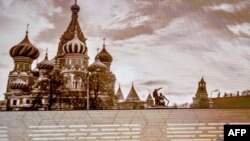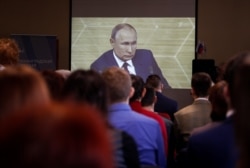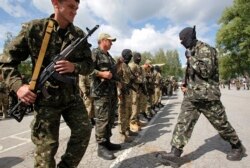Russian President Vladimir Putin held his annual press conference with journalists on Thursday — a more than four-hour freewheeling event highlighted by swipes at the push to impeach President Donald Trump and suggestions that an adjustment to Russia's constitution could extend to Putin's hold on power when his current term ends in 2024.
The annual press conference, now in its 15th year, long ago morphed into an exercise that paints Putin as the indispensable leader of the nation. The Russian leader was as comfortable reeling off the wages of doctors in far-flung Russian regions as he was discussing key global events.
This year's event came a day after congressional Democrats voted to impeach President Donald Trump — the third time in U.S. history an American leader was formally sanctioned by Congress.
There was intense interest in what Putin might say about a process that has put allegations of Russian election interference — and unproven conspiracies of meddling by neighboring Ukraine in U.S. politics — under the microscope in Washington.
Yet when prompted, Putin appeared to echo White House talking points, arguing the impeachment process was a sham launched by Democrats for "completely fabricated reasons."
"This is nothing but a continuation of an internal political struggle, with the party that lost the election, the Democratic Party, trying to reach its goal by different means," Putin said.
The Democrats tried to overturn the 2016 U.S. election results with an investigation into Russian meddling, he added. Having failed at that, "it's now Ukraine's turn," the Russian leader said.
Addressing another key issue in U.S.-Russian relations, Putin reiterated his calls for the immediate extension of New START, the sole remaining agreement limiting nuclear weapons, and the subject of recent negotiations between Moscow and Washington earlier this month.
"We are ready until the end of the year to extend the existing agreement, the New START treaty," said Putin. "But thus far, there has been no answer to any of our suggestions. And without a New START treaty, there is nothing to curb an arms race. And that, in my opinion, is bad."
Bread and butter
On the domestic front, Putin faced questions ranging from concerns over climate change in Russia's North, long-simmering anger over the disposal of trash from Russia's major urban centers, breakdowns in health care, declining salaries and demographics, as well as criticism over laws that do little to protect Russian women from domestic violence, among other issues.
The government was aware of the problems, argued Putin, while acknowledging that more work was needed.
The press conference is a rare occasion — some would argue a once-in-a-lifetime lottery — for Russian journalists to inform Putin of issues that he seemingly would fix if he was aware of them.
What were his plans to tackle lower doctor wages in the Urals? The prohibitively expensive flights from the Far East? Blatant police corruption and abuse? What would he do to protect Russian athletes smeared by doping scandals?
With domestic problems piling up, a Bulgarian journalist launched into a prayer for the Russian leader. It was met with scattered applause.
Ukraine impasse
Putin also assessed recent talks aimed at ending the five-year war between pro-Russian separatists and Ukrainian government forces in east Ukraine's Donbass region that has killed over 13,000 people.
The Russian leader acknowledged some progress with newly elected Ukrainian President Volodymyr Zelenskiy, but he still blamed Kyiv for failing to engage in direct talks with rebels under the stalled Minsk peace accords negotiated with European powers.
"Direct dialogue on Donbass is needed," said Putin. "You can't solve the problem by force."
Yet the Russian leader again refused to concede — despite well-documented evidence — that Russian mercenaries and army regulars had played a role in the uprising.
"There are few Germans and French fighting there," said Putin, noting their numbers weren't significant enough to alter the battle terrain.
Beyond Putin?
But the domestic headline of the day was Putin's hint — seemingly out of the blue — that an adjustment to constitutional term limits may be needed to keep qualified politicians in office.
"One thing that could be changed about these terms is removing the clause on successive terms," he said, when asked about increasing political competition in Russia by the state RIA-Novosti News Service.
"Your humble servant served two terms consecutively, then left his post, but with the constitutional right to return to the post of president again, because these two terms were not successive," added Putin. "Some of our political analysts and public figures are troubled by this. Well, maybe it could be removed."
The comment was widely interpreted as a key signal of Putin's possible intentions when his current term ends in 2024 after nearly a quarter-century in power.
A deadly attack
Despite the event's tradition as the key year-end news event in Russia, Putin's performance was later upstaged by a deadly armed assault on the main building of the Federal Security Services (FSB), the former KGB headquarters in downtown Moscow where Putin briefly headed operations in the late 1990s.
The attack coincided with celebrations marking Russia's intelligence services, commonly known by Russians as Chekist's Day.
Putin, himself a career KGB officer in the Soviet Union, was celebrating Chekist's Day at the Kremlin when the attack occurred.
According to the FSB, one agent was killed and five others wounded after an armed gunman opened fire inside the compound. Witness video from the scene showed pedestrians fleeing the scene as shots rang out.
The Interfax news agency quoted FSB sources as saying the shooter was later "neutralized."
An investigation into the motive and timing of the attack was under way.








